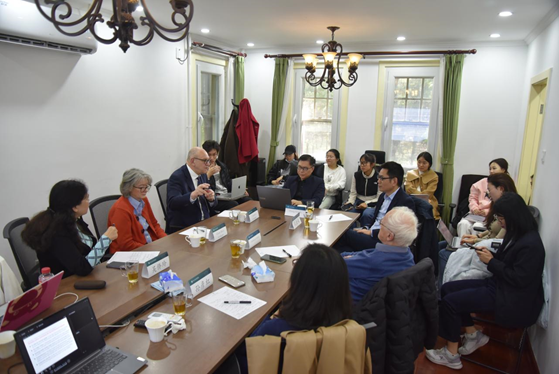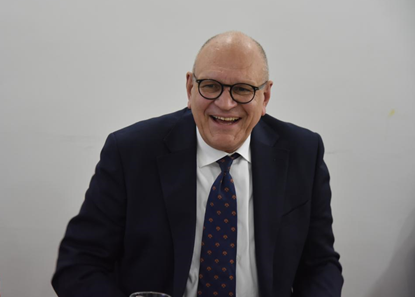
The 33rd seminar of the “Adventus Amicorum” series hosted by the Institute of Area Studies, Peking University (PKUIAS) was held on November 1, 2024. The keynote speaker was Lorenzo Codogno, former Chief Economist of the Italian Ministry of Economy and Finance and visiting professor at the London School of Economics. The theme of the lecture was “The Current Situation of the European Economy and Its Prospects.” The seminar was moderated by Duan Demin, associate professor at the School of Government, Peking University, and featured comments from Zhang Yongle, deputy director of PKUIAS and associate professor at the Law School. The seminar also saw the participation of Sun Yanhong, director of the European Economic Research Office at the Institute of European Studies of the Chinese Academy of Social Sciences; Wu Qiaoling, professor at the School of Economics and the Peking University–Bank of China EU Economic and Strategic Research Center; visiting professor Anthony Carty; and PhD students from various departments within the university.
In his speech, Prof. Codogno emphasized that the core theme of the lecture was to explore the current state and future of the European economy. He provided an in-depth analysis from a historical perspective, briefly reviewing the convergence and divergence of economic growth in the Eurozone, with a focus on the economic performance of different EU member states. He pointed out that significant disparities existed in economic growth within the EU, with Germany, as a core country in the Eurozone, demonstrating strong economic resilience, while Italy’s long-term economic challenges reflected deep-rooted structural issues. Prof. Codogno stressed that one of the key factors contributing to economic divergence among Italy and other EU countries was insufficient investment, leading to a weak economic foundation and low innovation capability. To achieve economic recovery and growth, Italy and other countries facing similar issues must implement effective policy measures to increase investment and promote technological innovation, thereby enhancing total factor productivity. Sustainable economic growth can only be achieved through structural reforms.
Following this, Prof. Codogno reviewed four shocks the Eurozone had experienced since its establishment and the corresponding responses, analyzing the current risks posed to globalization and open trade. He noted that the Eurozone had revealed the fragility of its economic structure and the limitations of policy responses during shocks such as the global financial crisis, sovereign debt crisis, COVID-19 pandemic, and the current energy crisis. Establishing a more robust economic system and effective policy framework to address potential future shocks has become an urgent issue for the Eurozone and its member states.
On this basis, Prof. Codogno further discussed the challenges facing the global economy, including geopolitical tensions, the aftermath of the pandemic, and the energy crisis. He indicated that trade frictions between the US and China and the conflict between Europe and Russia had increased uncertainties in international trade. Moreover, the ongoing impact of the pandemic on the service and tourism sectors has led to significant disparities in the pace and extent of economic recovery among different countries. Additionally, the reliance of some European countries on Russian energy has resulted in high energy costs and supply shortages, further exacerbating inflation and making the economic recovery outlook more uncertain.

Finally, Prof. Codogno looked ahead to the roles of China and the EU in the global economy. He argued that in this complex global economic context, China, as the second-largest economy in the world, played a crucial role. In response to these challenges, China is accelerating its transformation by promoting domestic demand and innovation, thereby enhancing economic resilience. This transformation not only drives China’s own economic development but also brings new opportunities to the global market. Simultaneously, the EU also holds significant influence in the current global economic environment. In the face of economic challenges, the combination of the EU’s fiscal and monetary policies has demonstrated its resolve for unity and cooperation in crisis response. By centralizing bond issuance, the EU can reduce financing costs and provide essential financial support to member states in distress. However, the EU also faces both internal and external challenges, with balancing national interests and ensuring stable regional economic development being key tasks. Overall, the challenges of inflation and monetary policy in the Eurozone are complex and volatile. In the future, policymakers need to closely monitor market trends and flexibly adjust policies to adapt to the changing economic environment, ensuring the sustainability and stability of economic recovery.
During the discussion session, participants engaged in in-depth exchanges with Prof. Codogno about issues raised in the lecture. Zhang Yongle discussed US–EU relations, the prospects for European integration and Sino-European relations, drawing on his research experience. Wu Qiaoling highlighted the potential and development prospects of cooperation between China and the EU in the area of green development. Sun Yanhong focused on Germany’s strong economic resilience in the 1970s and engaged in a deep discussion with Prof. Codogno about the reasons for the economic divergence in EU development. Prof. Codogno responded positively to each of these discussions.


